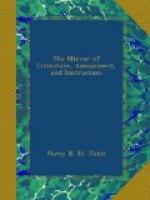Laugh at the jocund bridal feast, and weep
When the fair corse is laid in blessed rest,
Deep, deep in mother earth. Oh, happier far,
So to have lost my child!
FICKLE GREATNESS.
Thou art as one
Perched on some lofty steeple’s
dizzy height,
Dazzled by the sun, inebriate by long
draughts
Of thinner air; too giddy to look down
Where all his safety lies; too proud to
dare
The long descent to the low depths from
whence
The desperate climber rose.
RIENZI’S ORIGIN.
There’s the sting,—
That I, an insect of to-day, outsoar
The reverend worm, nobility! Wouldst
shame me
With my poor parentage!—Sir,
I’m the son
Of him who kept a sordid hostelry
In the Jews’ quarter—my
good mother cleansed
Linen for honest hire.—Canst
thou say worse?
Ang. Can worse be said?
Rie. Add, that my boasted schoolcraft Was gained from such base toil, gained with such pain, That the nice nurture of the mind was oft Stolen at the body’s cost. I have gone dinnerless And supperless, the scoff of our poor street, For tattered vestments and lean, hungry looks, To pay the pedagogue.—Add what thou wilt Of injury. Say that, grown into man, I’ve known the pittance of the hospital, And, more degrading still, the patronage Of the Colonna. Of the tallest trees The roots delve deepest. Yes, I’ve trod thy halls, Scorned and derided midst their ribald crew, A licensed jester, save the cap and bells, I have borne this—and I have borne the death, The unavenged death, of a dear brother. I seemed, I was, a base, ignoble slave. What am I?—Peace, I say!—What am I now? Head of this great republic, chief of Rome— In all but name, her sovereign—last of all, Thy father.
CIVIL WAR.
The city’s full
Of camp-like noises—tramp of
steeds, and clash
Of mail, and trumpet-blast, and ringing
clang
Of busy armourers—the grim
ban-dog bays—
The champing war horse in his stall neighs
loud—
The vulture shrieks aloft.
FEAR.
Terror, not love,
Strikes anchor in ignoble souls.
THE CAPITOL BELL.[3]
[3] The passage between commas is omitted in the representation, but we know not why.
It is the bell that thou so oft hast heard
Summoning the band of liberty—“the
bell
That pealed its loud, triumphant note,
and raised
Its mighty voice with such a mastery
Of glorious power, as if the spirit of
sound
That dwells in the viewless wind, and
walks the waves
Of the chafed sea, and rules the thunder-cloud
That shrouded him in that small orb, to
spread
Tidings of freedom to the nations.”




